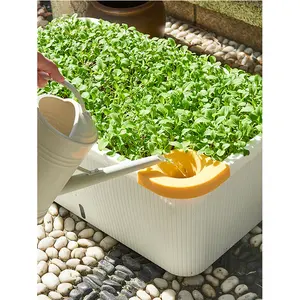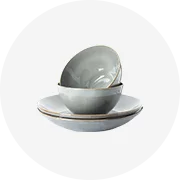

Hot Sale 128 Cells 0.8mm 0.9mm 1.0mm Seed Tray PS Germination Tray For Nursery Of Vegetables 128 Plastic Seedling Tray

Thickened Plastic Flower Vegetable And Fruit Pots Indoor And Garden Balcony Planting Box




















Plant seedling trays are specialized containers designed to cultivate young plants from seeds. These trays provide a structured environment for seed germination, ensuring that seeds receive the necessary moisture, nutrients, and support as they sprout and develop into seedlings. They are used by horticulturists, gardeners, and commercial growers who wish to streamline the process of starting plants from seeds. The use of seedling trays offers several advantages over traditional methods of planting seeds directly into the soil, including better control over the early growth stages, protection from pests, and the ability to optimize growing conditions for the plant.
These trays work on the principle of providing a nursery environment for seeds that simulates the natural conditions of the soil. They typically have a bottom that can hold a growing medium such as soil, peat, or paper pulp, with compartments or spaces for individual seeds to sprout. The design of these trays often incorporates features like drainage holes to prevent waterlogging, and some are made from materials that help retain moisture, reducing the need for frequent watering. The use of these trays also allows for easy transportation of seedlings once they are ready to be transplanted into larger pots or directly into the ground.
Plant seedling trays are made from various materials such as plastic, wood pulp, or biodegradable substances, each offering different benefits and applications. They come in a range of sizes, shapes, and designs to accommodate different types of plants and growth stages. From small containers for individual sprouted seeds to larger trays for mass seed starting, these products serve as an essential tool for the efficient management of plant propagation.
Plant seedling trays come in a variety of types to suit different needs and preferences in gardening and agriculture. Here's an overview of some common types:
Standard Seedling Tray: This is the most commonly used type found in nurseries and garden centers. It is usually made of plastic and comes with multiple cells for individual plantings. These trays are sturdy and can be reused numerous times.
Germination Tray: Often used for starting seeds indoors, these trays provide an ideal environment for germinating plants. They may include a clear lid that helps retain moisture and maintain consistent temperature levels.
Propagation Tray: These are larger trays designed for growing multiple plants at once. They are commonly used in commercial settings where large quantities of seedlings are produced.
Hydroponic Tray: Specifically designed for hydroponic systems, these trays facilitate the growth of plants without soil. They are made to fit into hydroponic platforms and often have special features that aid in nutrient delivery.
Decorative Tray: With an emphasis on aesthetics, decorative trays may be used for display purposes in settings like garden beds, patios, or home gardens. They often feature unique shapes or patterns to add visual interest.
Choosing the right plant seedling tray is vital for any business involved in commercial horticulture or retail garden centers. When selecting plant seedling trays wholesale on Alibaba.com, several considerations should be taken into account:
Material: The choice of material affects durability and moisture retention. For instance, plastic is long-lasting and can hold up well against repeated use, while biodegradable options might be preferred for eco-friendly businesses.
Size and Configuration: Depending on the intended use—from small-scale home gardening to large-scale commercial operations—tray size should be chosen accordingly. Also consider the number of cells; a finer grid may be necessary for certain plant types.
Features: Features such as drainage holes, sturdy walls, and compatibility with heat mats can be crucial depending on the specific needs of the seeds being germinated.
Application: Some trays are designed for general seedlings while others may cater specifically to delicate or heavy-rooted plants. The application will determine which type of tray is best suited for your operation.
For businesses seeking reliable sources for plant seedling trays, Alibaba.com stands out as a global marketplace connecting buyers with suppliers offering an extensive variety of tray options. With over two decades of experience in facilitating B2B transactions across borders, Alibaba.com has established itself as a platform where diversity meets quality. The website's vast selection ensures that whether you're engaged in large-scale commercial farming or specialized horticulture practices, you'll find suitable tray choices that align with your requirements.
Alibaba.com's commitment to streamlining online trade is evident in its user-friendly interface and services like Trade Assurance which add a layer of protection for buyers by ensuring payments are secure until order delivery is confirmed. Moreover, with features accommodating mobile purchases and multilingual communication, Alibaba.com caters to buyers from all over the world making it easier than ever to source products efficiently.
By choosing Alibaba.com for your plant seedling tray needs, you leverage a platform that values quality assurance and customer satisfaction. Suppliers on Alibaba.com offer customizable options that can resonate with your brand identity while meeting your practical demands. This level of flexibility coupled with robust supplier verification processes exemplifies why Alibaba.com is a trusted partner in online wholesale trade solutions for businesses globally.
Plant seedling trays are commonly made from materials like plastic (PS, PVC, HDPE), wood pulp, paper pulp, and compressed peat. The choice of material affects the tray's durability, reusability, and sustainability.
Consider the type of plants you are growing, the required tray durability, the size of the seedlings, and whether you need a multi-cell or single-cell tray. Also, assess whether you need a standard-sized tray or a specialized tray like deep or square.
Yes, there are eco-friendly options made from materials like paper pulp or biodegradable plastics. These trays are biodegradable and suitable for businesses looking to minimize their environmental impact.
Many plastic and wood pulp trays are designed for reuse and can be durable if handled carefully. However, single-use plastic trays are also common for seed starting and are particularly useful in large-scale operations or where cross-contamination is a concern.
For commercial use, look for features such as sturdiness, ease of assembly, compatibility with automated systems, and consideration for quick root development when choosing a plant seedling tray.
The number of cells in a plant seedling tray determines how many individual seedlings can be started and then transplanted. Trays with more cells are better suited for smaller-sized plants or where space is limited.
Plant seedling trays are commonly used in agriculture for starting seeds, cultivating young plants for transplanting into fields or gardens, and managing greenhouse seedlings before planting.
Consider the space where the seedlings will be placed and the final size of the plants being propagated. Larger trays can accommodate more substantial plants while smaller ones may be suitable for smaller or limited-space applications.
Many suppliers offer customization options such as printing your business logo on the trays. This can be an effective way to enhance brand visibility and align with corporate identity.
Multi-cell seedling trays allow for efficient use of space by growing several plants at once. They are particularly beneficial for commercial businesses that require maximizing output per square foot.
For outdoor use, select durable materials like high-density plastics or metals that can withstand varying weather conditions. Trays with additional stability features such as thicker walls or reinforcements should be considered.
Cell size refers to the individual compartments within a seedling tray. Smaller cells can accommodate finer seeds or cuttings, while larger cells are better for bigger or more robust plants that require more space to grow.
For hydroponic systems, choose trays that are compatible with water-based environments. Materials should be non-absorbent and easy to clean to prevent nutrient buildup and mold growth.